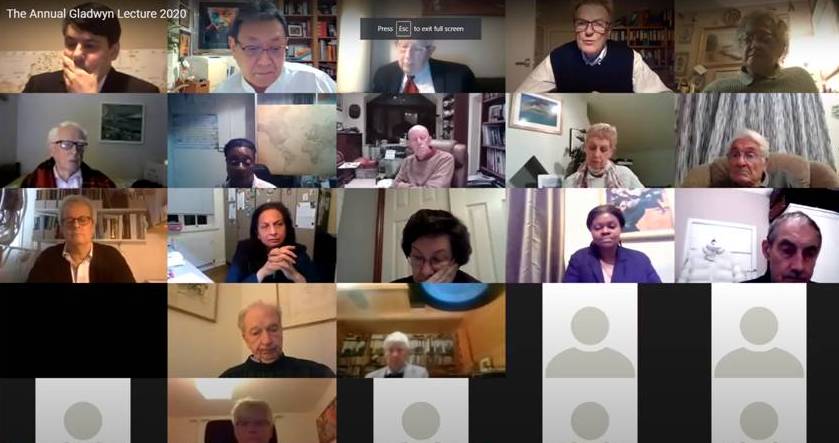 Former MP Stephen Twigg delivered this year's Gladwyn Lecture
Former MP Stephen Twigg delivered this year's Gladwyn Lecture
Can the Commonwealth find a unique role in the world’s quest to achieve its Sustainable Development Goals (SDGs) by 2030? That was the focal point of a virtual conference entitled Agenda 2030: Achieving the Sustainable Development Goals – How might the Commonwealth deliver success? It was held on 11 November and organised by the Council for Education in the Commonwealth (CEC).
If you’ve been hiding in a pre-Covid bubble of your own making, the Sustainable Development Goals (SDGs) are the 17 goals set in 2015 at the United Nations General Assembly, to be achieved by 2030. To understand the focus of this CEC event, it’s worth remembering three of those goals in particular: number 4 (quality education), 11 (sustainable cities and communities) and 16 (Peace, justice and strong institutions). To remind yourself of the whole list of 17 SDGs, the UN provides a comprehensive catalogue.
As the Covid pandemic continues to disrupt life across the planet, panellists at the CEC conference tried to look at whether the SDGs could still be achieved and within the same timeframe. The main speaker and contributors also sought to identify the unique ways in which the Commonwealth could make a difference to these global goals.
The lecture was delivered by the new Secretary-General of the Commonwealth Parliamentary Association (CPA), former UK MP Stephen Twigg. He said that the Commonwealth had a vital role to play in delivering the “huge and daunting” SDG agenda. “The next decade should be the decade of action,” he told his audience. He added that the Covid pandemic had made SDG achievement harder, but it had also shown the importance of some of the goals, such as health infrastructure and the need for collaboration.
He highlighted Commonwealth countries which had shown best practice in working towards the SDGs, naming Uganda, Malta, Namibia and the Bahamas.
The importance of education
Starting with SDG 4 – quality education – Mr Twigg said that education had been particularly hard hit by coronavirus. He outlined the key themes emerging: funding and investment in education, quality of teaching, collaboration, innovation and the importance of leaving no-one behind. The new CPA Head expressed concern about education funding being squeezed to support post-Covid investment in health and economic stability. He urged countries to raise their investment in levels of education.
He added that collaboration was necessary if local and national governments were to share innovations and knowledge of “what works best”. However, Mr Twigg pointed out that while working on the value of distance learning, countries could not ignore what he called the “stark digital divide”, which had been reinforced by the pandemic. He lauded the celebration and support of quality teaching, particularly in small developing states. He also highlighted the need to “champion the rights of all children”, from teenage pregnant girls and disabled children to child refugees.
Mr Twigg also urged the need to keep the focus on “a lifelong education system”, something which the CEC has discussed over the years, and to aim for lifetime quality education from early childhood to a thriving university system and beyond.
So what is the Commonwealth’s USP for SDG 4? For Stephen Twigg, it was the already carved-out network of legislators working together and the Commonwealth’s 2018 commitment to education. He urged the Commonwealth education ministers’ action group to “make education a true Commonwealth priority” while also giving attention to “citizenship education” to empower “active” young citizens.
SDG 16: Peace, justice and strong institutions
The CPA head said that SDG 16 provided a template to act on good governance, adding that a template already existed in the Commonwealth Charter and in the organisation’s Latimer House Principles.
The CPA is developing an academy to give Commonwealth parliamentarians access to more learning activities. Mr Twigg highlighted some of the dangers of the pandemic: emergency powers could be open to abuse and important issues could be neglected, such the challenge to maintain public access to justice, good governance and the fight against corruption. These areas were “not optional extras”, he told his virtual audience.
Stephen Twigg also pointed out that the SDGS 4 and 16 went “hand in hand” in helping to build the platforms for the other SDGs and for the overall Agenda 2030 SDG vision.
Best practice
The specific role of the Commonwealth came under scrutiny during the Q&A session. Stephen Twigg insisted that the Commonwealth institutionally could make a difference, using the focus of its existing Charter and principles and bringing added value to the focus on gender equality. He said the CPA would be widening its links and strengthening partnerships with UN bodies. He used the examples of the Commonwealth’s best practice on SDGs, including Bangladesh and Uganda taking in refugees – setting an example for richer countries to do more. He described the incoming Commonwealth Chair, Rwanda, as “achieving great things” in education and said health would be a key issue at the Commonwealth Heads of Government Meeting in Kigali in 2021. He pointed to the importance of SDG 16 and what he called the “stark example” in Rwanda during the genocide in 1994, when peace and justice were lacking.
On the proposed closure of the Institute of Commonwealth Affairs, Stephen Twigg spoke of the widespread concern about the University of London’s plans. He said the CPA had sent a letter to the vice-chancellor pointing out that it was “increasingly important that the Commonwealth is featuring in education… not just for universities, but for young people”. He added: “The voices of the Commonwealth have been absolutely loud and clear and the Institute has heard them.”
Questions from the virtual audience focused on the issue of whether the SDG timeline should be revised in a post-Covid world. Stephen Twigg said it was important to keep the 10-year focus and that delay would result in issues falling off the SDG agenda.



